|
|
|
Sort Order |
|
|
|
Items / Page
|
|
|
|
|
|
|
| Srl | Item |
| 1 |
ID:
123924
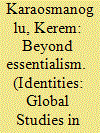

|
|
|
|
|
| Publication |
2013.
|
| Summary/Abstract |
In Turkey, the Alevi cultural 'revival' of the 1990s has been followed by a multifaceted identity-formation process that involves conflicting religio-cultural agendas, intersecting discourses and differing politico-ideological affiliations. Lacking a focus, this process continues to trigger an enriching public debate on Alevi identity, which has been coined an 'enigma' and is considered to be associated with 'ambiguity' and 'ambivalence' by many. What lies beneath the veil of ambiguity has to do with the 'anti-essentialist' transformation of Alevism, which reaches beyond religious, cultural and political orthodoxies. As a result of diverse political loyalties, contestation of discourses on Alevi culture and identity and the equivocal character of the Alevi subject, the Alevis seem to be resisting essentialism. In urban Turkey, an anti-essentialist discourse potentially influencing Alevism, I argue, enables the Alevi self to act with a sense of reflexivity and to search for ways to avoid political, cultural or religious orthodoxies.
|
|
|
|
|
|
|
|
|
|
|
|
|
|
|
|
| 2 |
ID:
123929
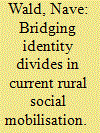

|
|
|
|
|
| Publication |
2013.
|
| Summary/Abstract |
The shift from a corporatist citizenship regime to a neoliberal one has adversely affected Latin American rural communities and led to widespread social mobilisation and organisation in the countryside. The struggle of such marginalised communities has been often framed by stressing their indigenous collective identity over the previously prevalent class-based peasant identity. This article focuses on the role of identity and the negotiation of different identities in the struggle of two rural organisations in Northwest Argentina for securing land tenure and improving their standards of living. Argentinean society, in contrast to some other Latin American societies, is often imagined as 'white,' but in recent decades many peasant, or campesino, communities have rediscovered or reaffirmed their indigenous origin. This article therefore deconstructs rural collective identities in Argentina and analyses how class and ethnic identities are negotiated in struggles of grassroots social organisations in the countryside of this predominantly urban country.
|
|
|
|
|
|
|
|
|
|
|
|
|
|
|
|
| 3 |
ID:
123921
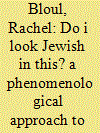

|
|
|
|
|
| Publication |
2013.
|
| Summary/Abstract |
Racialised interactions inform the corporeal memory of both racists and their victims. This translates in bodily styles which reproduce alienated intercorporeal exchanges. The racial abjection of the victims is embedded at the somatic level in a racialised corporeal schema which obtains even when victims are not a priori visibly different to an external observer. The damaging intercorporeal dynamics of racialised abjection resist critical deconstruction. This explains the unwitting reproduction of racism even by those who consciously repudiate it and the difficulties of explaining to non-victims the enduring - and damaging- effects of those crucial moments when 'the glance of the other brings about a break in embodiment'.
|
|
|
|
|
|
|
|
|
|
|
|
|
|
|
|
| 4 |
ID:
123923
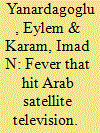

|
|
|
|
|
| Publication |
2013.
|
| Summary/Abstract |
Turkish television drama series were locally produced products until the early 2000s. Since then, about 70 different titles have been broadcast to audiences in 40 countries, especially in the Middle East, where they comprise approximately 60% of the share in foreign programme broadcasts. This article explores the factors that led to such an attraction by considering the debates around the impact of transnational media products on Arab cultural identity. The authors conducted focus groups and interviews with audiences in Palestine and Egypt and with the producers/distributors of these TV series in Turkey. The data presented here comprise the results of one of the first field-based studies on the reception of Turkish media products in the region. Foremost, the Arab audience response to these Turkish TV series highlights the differences in conceptualisations of 'modernity' in the Arab World. Moreover, the data suggest that audiences do not necessarily consider transnational media products as culprits that corrupt cultural identity.
|
|
|
|
|
|
|
|
|
|
|
|
|
|
|
|
| 5 |
ID:
123930
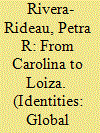

|
|
|
|
|
| Publication |
2013.
|
| Summary/Abstract |
This article considers the entanglements of race, culture and place in Puerto Rico. I analyse two distinct constructions of blackness that sustain racial hierarchies intrinsic to Puerto Rican 'racial democracy'. First, 'folkloric blackness' is a static, historicised version of blackness that represents Puerto Rico's African heritage without compromising the whitening bias of racial democracy discourse. A second construction of blackness that I term 'urban blackness' also circulates throughout the island, but instead serves as the counterpoint to the rest of the presumably 'whiter' Puerto Rico. Both have been emplaced within distinct, bounded locations, and affiliated with certain cultural practices. I argue that these 'emplacements' that arise from the associations between race, culture and place produce specific constructions of blackness that appear contradictory, yet ultimately work together to maintain the racial hierarchies intrinsic to racial democracy discourses.
|
|
|
|
|
|
|
|
|
|
|
|
|
|
|
|
| 6 |
ID:
123918
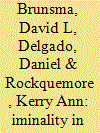

|
|
|
|
|
| Publication |
2013.
|
| Summary/Abstract |
Although researchers have investigated Multiracials for their racial identity 'choices', many scholars continue to conceptualise racial identity as monolithic. This article both problematises and extends the notion of racial identity with an 'identity matrix'. This concept grounds the sociological processes of constructing and deploying a racial identity as strategic and agentic in interactional, political, cultural, physical (embodiment) and institutional contexts. Using insights from survey data from 231 black-white Multiracial young adults and follow-up in-depth interviews with 24 of these respondents, we develop the concept of 'identity matrix' both theoretically and empirically. This article provides heuristic results that we hope will encourage more development of methodological and theoretical complexity in the study of racial identity, allowing scholars to think about the various identities of Multiracials, the possibility of and conditions enabling an emergent Multiracial consciousness, as well as the socio-cognitive structure and active deployment of identity matrices across other social groups.
|
|
|
|
|
|
|
|
|
|
|
|
|
|
|
|
| 7 |
ID:
123922
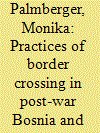

|
|
|
|
|
| Publication |
2013.
|
| Summary/Abstract |
In this article, I bring together literature from the fields of memory and reconciliation to investigate practices of 'border crossing' in post-war Bosnia and Herzegovina. While national divisions prevail, subtle attempts at border crossing can be witnessed even in those areas most impacted by the war's partition, such as in Mostar, a city that has been left divided into Croat and Bosniak sides. Borders are physically crossed to reintegrate the 'other side' into one's everyday life, but also in a more metonymical sense through the questioning of absolute national identities. Such acts of border crossing heavily rely on memories of positive pre-war cross-national relations, which are brought forward to re-establish these relations in post-war times. The research findings suggest that re-enacting a shared common ground - most often found in the past rather than in the present - bears an integrative potential that deserves more attention in post-conflict settings.
|
|
|
|
|
|
|
|
|
|
|
|
|
|
|
|
| 8 |
ID:
123932


|
|
|
|
|
| Publication |
2013.
|
| Summary/Abstract |
Migratory movements are one of the most remarkable demographic, social and psychological phenomena in today's world. For the people involved, these migrations pose a radical change in environment and in their lives as they face adaptation to new perceptions, values and behaviours. All these lead to major challenges and repercussions for their personal and social identities. Using the Theory of Social Identity as our interpretative framework, together with a qualitative methodology based on semi-structured interviews, we have researched the entrepreneurial behaviour seen in 94 immigrants. We show the strategies adopted by these immigrants for personal mobility, social creativity and social competition to cope with the negative social identity derived from the occupational segregation and socio-labour exclusion they experience in the labour market and as mechanisms for psychosocial adaptation to the social, political, economic and labour characteristics in their environment.
|
|
|
|
|
|
|
|
|
|
|
|
|
|
|
|
| 9 |
ID:
123919
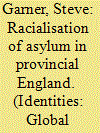

|
|
|
|
|
| Publication |
2013.
|
| Summary/Abstract |
This article examines the discursive racialisation of asylum-seekers by residents of Portishead, a small English town, a process demonstrating a classed and placed set of expressions of whiteness. I study the racialisation of a diverse group of people from the bottom-up, through an analysis of residents' letters of objection to the Government's request for planning permission to turn a building into an asylum processing centre in 2004. Three registers of language are presented: 'technocratic', 'resentful' and 'conjectural'. Racialisation is expressed through shared ideas about the type of space in Portishead, and the type of people appropriate for it. The space is constructed as white and middle-class: the asylum-seekers are produced discursively as neither and therefore as not belonging. I suggest that the phenomenon of relatively powerful groups constructing themselves as weak and beleaguered can be conceptualised as a form of 'defensive engagement'.
|
|
|
|
|
|
|
|
|
|
|
|
|
|
|
|
|
|
|
|
|